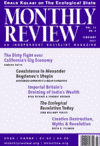Global

In his Theses on Feuerbach, Karl Marx suggests that the main flaw of all previous materialism has been to uncritically accept and champion a notion of matter that has its proper place in a dualistic framework, where matter is passive and the mind is active. If this is so, true materialism will conceive of matter as an active principle, and of material beings as perfectly capable of conscious sensation and agency. | more…

Engels was neither a reductionist nor a positivist, and, far from being a political fatalist, he embraced a form of interventionist politics that was underpinned by a historically emergent ethics. It was this standpoint that he aimed to philosophically ground in Dialectics of Nature. | more…

In Socialist Practice, a collection of essays on leftist theory and experiences, Victor Wallis adheres to the view that the achievement of socialism is a drawn out, nonlinear process consisting of episodes that in many cases have a mixed impact on the revolutionary cause. He analyzes several, ranging from the seven decades of Soviet rule to the New Left of the 1960s. His main thesis is that over the last century pure socialism has never existed and that on all fronts socialist movements and governments have contained elements of the old—namely, capitalism. | more…

By the time he was 26, Michael Tigar was a legend in legal circles well before he would take on some of the highest-profile cases of his generation. In his first U.S. Supreme Court case—at the age of 28—Tigar won a unanimous victory that freed thousands of Vietnam War resisters from prison. A relentless fighter of injustice—not only as a human rights lawyer, but also as a teacher, scholar, journalist, playwright, and comrade—Tigar has been counsel to Angela Davis, Jamil Abdullah Al-Amin (H. Rap Brown), the Chicago Eight, and leaders of the Black Panther Party, to name only a few. It is past time that Michael Tigar wrote his memoir. | more…

Those who control the world’s commanding economic heights, buttressed by the theories of mainstream economists, presume that capitalism is a self-contained and self-generating system. Nothing could be further from the truth. In this pathbreaking book—winner of the Paul A. Baran-Paul M. Sweezy Memorial Award—radical political economists Utsa Patnaik and Prabhat Patnaik argue that the accumulation of capital has always required the taking of land, raw materials, and bodies from noncapitalist modes of production. They begin with a thorough debunking of mainstream economics. Then, looking at the history of capitalism, from the beginnings of colonialism half a millennium ago to today’s neoliberal regimes, they discover that, over the long haul, capitalism, in order to exist, must metastasize itself in the practice of imperialism and the immiseration of countless people. | more…

The Return of the Geopolitics of the Second International
In 1990, when renowned Indian Marxian economist Prabhat Patnaik asked “Whatever Happened to Imperialism?,” once vibrant and influential schools of theories on imperialism were at a postwar historic low. When he left the West to return to India in 1974, imperialism was at the center of all Marxist discussions. But when he came back to the West merely fifteen years later, imperialism already seemed out of fashion. The retreat from the question of imperialism has marked a return of what we can call Second International politics. | more…
The COVID-19 pandemic has brought into sharp relief the deep structural problems affecting nonwhite racialized workers in the core and periphery. Yet, many social scientific analyses of the global political economy, at least in the pre-COVID era, are race neutral or willfully indifferent to the persistent racial pattern of global inequalities. Even if they do address legacies of colonialism, they ignore the ongoing racial logics of oppression embedded therein. | more…

The Development of Productive Forces in Contemporary Capitalism
Capitalist modernity not only contains profound contradictions, but is also undergoing a significant transformation. Far from acting as a driving force for the development of social productive forces, it has become a parasitic entity with an essentially rentier and speculative function. Underlying this is an institutional framework that favors the private appropriation and the concentration of the products of general intellect. | more…

Encountering Marx and Joyce
“In the mid-1990s, when I lived in central London, I used to walk past the British Museum nearly every day. More often than not, I would pop in, did so for years, getting thrilled by a couple of things. The first was entering the great Reading Room, for which I had a Reader’s Card, glimpsing and even sitting in space G-7. I never ordered any books, had no need to order anything; all I wanted was to sit there, in Karl Marx’s seat, and try to feel the vibe. Usually, there was no vibe, only the hushed shuffling and page turning of others close by, mixed with the odd cough and splutter.” | more…

We remember our good friend and comrade, Leo Panitch, one of the great socialist intellectuals of all time, who died on December 19, 2020, age 75. | more…

Although natural constraints on supply are important, most economic scarcities that rule our lives are actually social and artificial. Supply and demand are not natural forces drifting through the air; they are contrived realities established by an interactive social environment involving governments, corporations, institutions, and classes. Supply and demand cycles are social constructs designed to answer a basic question: Who gets what? | more…

The Ecological Revolution was first published a little more than ten years ago in April 2009, at a time when climate change had already been recognized as a pressing global issue for over two decades, but when there was still hardly any realistic discussion of its connection to capitalism or of the immense ecological and social revolution that would be required to overcome the Earth System crisis. Let us look back to understand the historical gulf separating that time from our own. | more…










